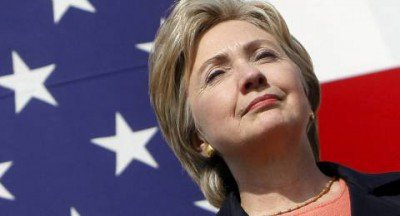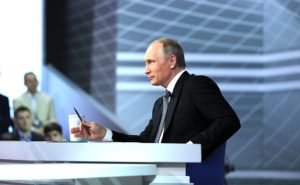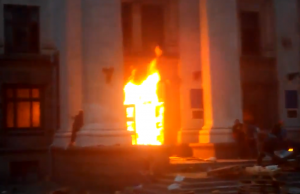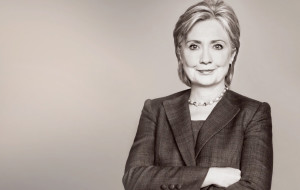Anti-Russia Hysteria, Moscow Election-Rigging: Hillary Clinton’s Exploits in McCarthyism

Now that the 2016 election campaign is at long last over, an examination of the reckless, fact-free, innuendo-laden McCarthyite rhetoric which Hillary Clinton’s campaign surrogates deployed over the past several months is in order.
The first and most obvious point to be made is that the anti-Russia hysteria that characterized the election, particularly in its final weeks, did not come out of nowhere; in fact, it should be seen as part of a natural progression of the elite media’s Russophobia which took root in and around the Ukraine crisis of late 2013-early 2014 and led, almost ineffably, not only to charges of Russian election-rigging in the United States but in the identification, in the pages of Newsweek and the Washington Post, of Russian fifth-columns within the United States.
How the Ukraine crisis poisoned America political discourse is by now well known. As I reported in The Nation almost 18 months ago, the cottage industry of unscrupulous neo-McCarthyites which has grown up around Washington, London and Manhattan in recent years has sought to stifle debate by bandying charges of unpatriotic disloyalty against anyone questioning the wisdom of U.S. policy toward Russia. (It bears noting that something similar regarding Syria policy is happening as I write, driven, for the most part, by the usual suspects.)
As one long time political scientist told me at the time, “The atmosphere here in the U.S. created by the Ukraine crisis is poisonous – and I say this having been an academic for 37 years.”
The millennial careerists who help staff the ranks of the New Cold Warriors instinctually reach for ad hominem attacks over reasoned argument – and in so doing helped make way for the tactics the Clinton campaign unleashed in 2016.
By the time the nominating conventions rolled around this summer, the Clinton campaign was engaged in a Twenty-first Century witch hunt against any Trump adviser who had so much as visited Russia. Trump campaign manager Paul Manafort and foreign policy adviser Carter Page were both hounded out of the campaign by Clinton-inspired media smears.
Clinton’s campaign, which was run by Robby Mook, a 36-year-old hot shot who clearly relished his role as a kind of millennial Roy Cohn, repeatedly attacked former Ambassador to Germany and arms control negotiator under Ronald Reagan, Richard Burt.
Burt was singled out, not only by the Clinton camp, but by Salon and Newsweek, because he had served as an adviser to Alfa Bank, the Russian bank which played a starring role in former New Republic editor’s Franklin Foer’s thoroughly debunked article on the Trump Organization’s (non-existent) “secret” email server.
Yet what is most interesting isn’t so much the smears – phrases like “useful idiot” and “Kremlin stooge” which are mostly warmed-over fare from the first Cold War – but the mindset of the New Cold Warriors. How is it that these self-anointed crusaders for “humanitarian intervention” and “democratization,” these self-appointed enemies of tyranny, end up on the side of neo-Nazis in Ukraine, Al Qaeda and al-Nusra affiliate in Syria, all the while stirring up sectarian and nationalist pathologies across the Middle East and Eastern Europe?
Cold War Nostalgia
The first thing to recognize is that our New Cold Warriors suffer from la nostalgie de la guerre froide. The historian John Lukacs has written at length on this pathology. In his destined to be classic The End of The Twentieth Century, Lukacs cast a gimlet eye on what he saw as the tendency of academic and media types during the first Cold War to practice “anti-Communism at a safe distance.”

Russian President Vladimir Putin answering questions from Russian citizens at his annual Q&A event on April 14, 2016. (Russian government photo)
This tendency, according to Lukacs, sprang from two sources: first, from a “sense of self-satisfaction: knowing that one is on the right side, on the respectable side together with all of those right-thinking people.”
Lukacs, himself no apologist for Communism, also observed that this tendency is driven by “the exaggeration of the diabolical powers and machination of Communism and the Communists.” Substitute “Communism and the Communists” for “Putin and the Kremlin” and you have a perfect precis of New Cold Warrior thinking.
No better example of this tendency to talk a tough game against post-Communist Russia by academics and journalists safe in the knowledge that they will never be called upon to fight, was a conference convened by Franklin Foer’s New Republic in Kiev in May 2014.
Some background may be in order: The Ukrainian crisis – involving the violent ouster of elected President Viktor Yanukovych on Feb. 22, 2014 – escalated into a full-scale civil war in and around April 6 in the eastern Ukrainian city of Donetsk. The Western-supported government in Kiev, depicting the indigenous anti-coup movement for a Russian invasion, sent its military and privately funded militias to crush the uprising in what was called an “Anti-Terrorism Operation” or ATO.
To some, it was a tragedy of the first order that Kiev chose war and missed an opportunity to earn – via negotiation and compromise – much needed legitimacy in the east for what was, after all, a junta government.
Yet others, like Yale University historian Timothy Snyder and the New Republic’s literary editor Leon Wieseltier, embraced the ouster of Yanukovych and were positively exultant; so much so that they wasted little time in making their way to Kiev, “rallying to democracy’s side.”
The conference, “Ukraine: Thinking Together,” featured several luminaries of the liberal-interventionist left including Franklin Foer; Iraq War apologist Paul Berman; National Endowment for Democracy President Carl Gershman; a founding father of Poland’s Solidarity movement, Adam Michnik; a historian of Eastern Europe, Timothy Garton Ash; and the preening cheerleader of NATO’s war on Libya, Bernard Henri Levy.
In a note announcing the conference, Wieseltier, sounding an awful lot like Christopher Hitchens in the run-up to the Iraq War, declared: “We cannot just sit back and watch Putin’s imperialism and repression. There are times and places where one must stand up and be counted.”
From where did this impulse to “stand and up and be counted” arise? Well, Wieseltier’s remarks in Kiev are revealing and are worth quoting at length. In his rhetoric we can hear a not-so-faint echo of Edward Arlington Robinson’s Miniver Cheevy:
“I watched the progress of Putin’s imperialism beyond his borders and fascism within his borders, I ruefully remarked to Frank Foer that the moment reminded me of what I used to call my Congress for Cultural Freedom-envy — my somewhat facile but nonetheless sincere regret at having been born too late to participate in the struggle of Western intellectuals, some of whom became my teachers and my heroes, against the Stalinist assault on democracy in Europe. And all of a sudden, pondering the Russian aggression in Crimea, and the Russian campaign of destabilization in Ukraine, I realized that I had exaggerated my belatedness. I was not born too late at all.”
That explains rather a lot. Wieseltier – and in all likelihood Levy and Foer – were suffering from a bad case of history-envy and saw in the crisis in Ukraine a chance to assuage their consciences and prove their worth on the world-historical stage. It is, it must be admitted, an odd way to go about it, socializing in Kiev with a Facebook billionaire, your friends and neocon fellow travelers from the magazine all the while homes, schools and hospitals in eastern Ukraine were being shelled to bits by the very government you traveled so far to “demonstrate solidarity” with.
Putin Hatred
If Cold War nostalgia plays a role in shaping the weltanschauung of the New Cold Warriors, so too does their uncritical embrace of anyone who opposes Russian President Vladimir Putin. The New Cold Warriors are, in effect, blinded by pseudo-solidarity for Putin’s “victims” like the crass performance artists Pussy Riot and the wondrously corrupt former oligarch-turned-sainted dissident Mikhail Khodorkovsky.

Screen shot of the fatal fire in Odessa, Ukraine, on May 2, 2014, that killed scores of ethnic Russians while Ukrainian nationalists cheered. (From RT video)
And then, of course, there is the new Ukraine where the government, so enthusiastically embraced by Franklin Foer’s New Republic, has embarked on program of de-Communization which, since Ukraine and Communism parted ways a quarter of a century ago, means, in practice, a program of de-Russification, with all that entails, including, a conscious erasure of the Soviet Union’s role in defeating the Nazis and a whitewashing of Ukraine’s ugly history of anti-Semitism, including the role of Stepan Bandera, the wartime leader of the nationalist OUN which was responsible for the murder of hundreds of thousands of Jews and Poles.
As the magazine The Forward reported: “The whitewashing, now a disturbingly widespread phenomenon, ramped up in earnest after Ukraine’s 2013–2014 Maidan uprising and the ensuing conflict with Russia. On January 1, 2014, 15,000 ultra-nationalists marched through Kiev carrying placards with [Ukrainian nationalist Stepan] Bandera’s image and chanting OUN slogans; today, marches honoring Bandera, the OUN and Ukrainian SS units take place regularly across Ukraine.
“In the spring of 2015, Ukraine’s parliament passed a highly controversial law, mandating that Bandera and his groups be regarded as Ukrainian patriots, and making denial of their heroism a criminal offense.”
In a way, these developments were probably a long time in coming and have been facilitated by the effective disenfranchisement of a large share of the Russo-phone east. Consider the spike in nationalist sentiment in Eastern Europe in the post-Cold War years.
We return briefly to the historian Lukacs who observed in 1993 “a growing nostalgia and appreciation of nationalist Eastern European governments before and during the Second World War.” He observed that in the years following the fall of the Berlin Wall, “schools and streets” in Slovakia and Croatia were being renamed in honor of Nazi collaborators, while in Romania “the murderous Iron Cross now enjoys a recurrent wave of nostalgic prestige.”
The American media has willfully turned a blind eye to these similar and ominous developments in Ukraine (to say nothing of the recent torchlight parades in NATO-allied Estonia) because what matters among the New Cold Warriors is to appear to be “taking a stand” against the Russian bogeyman.
Ignoring Reality
And then there is the inability or unwillingness of the New Cold Warriors to take realpolitik considerations into account when it comes to Russia. This is odd, since they are as of one mind when it comes to far more sinister regimes like Saudi Arabia, where people quite literallyhave their heads chopped off in the middle of the street in broad daylight.

Nazi symbols on helmets worn by members of Ukraine’s Azov battalion. (As filmed by a Norwegian film crew and shown on German TV)
But, they will say, the U.S. needs Saudi Arabia because a) they have oil and b) they oppose the Iranians. As arch-neoconservative Bret Stephens recently said in an exchange with Sen. Rand Paul on MSNBC’s “Morning Joe,” we are “lucky” to have the Saudis as allies.
Leave that nonsense aside for the moment: the point is that the facility to think in terms of geo-strategy abandons the New Cold Warriors when it comes to Russia and Vladimir Putin. And so, the fact that Russia does not threaten American interests in our hemisphere; that it did more than most NATO allies to assist in the fight in Afghanistan (via the Northern Distribution Network); that it was a crucial player in the Iranian P5+1 negotiations (which the New Cold Warriors probably hold against the Russians, since they are nearly all opposed to the deal); and that it brokered the deal to dismantle Bashar al-Assad’s chemical weapons program in Syria are all studiously ignored in their analyses.
In other words, panic and handwringing over the alleged “cyber war” aside, Putin’s Russia does not threaten U.S. interests, properly defined. Indeed, Russia has, whether we find its domestic politics and widespread government corruption distasteful or not (and I do), proved to be an important partner when its core interests coincide with ours – which is more often than not.
Interests should drive policy not ephemeral, so-called “shared values” to which the New Cold Warriors themselves only fitfully adhere.
Twenty-five years ago, one U.S. president sketched out an alternative path to the one that the U.S. has been pursuing since Bill Clinton took office. In a speech much derided by those who practiced “anti-Communism at a safe distance,” President George H.W. Bush traveled to Kiev on Aug. 1, 1991, to warn against succumbing to the siren song of ethno-nationalism.
“Freedom, democracy, and economic liberty,” said Bush, “No terms have been abused more regularly, nor more cynically than these. Throughout this century despots have masqueraded as democrats, jailers have posed as liberators.” He continued in a vein almost unthinkable by an American president today: “Americans will not support those who seek independence in order to replace a far-off tyranny with a local despotism. They will not aid those who promote a suicidal nationalism based upon ethnic hatred.”
Bush was prescient: the steady diet of Russophobia and anti-Putin hysteria now underway (and de rigueur among the New Cold Warriors) is fanning the flames of ethno-nationalist hatred within Europe. Does this development enhance or detract from pan-European stability and U.S. national security?
The answer is clear. And yet the new crusaders persist, and worryingly, as of Tuesday, may have a commander-in-chief who completely shares their views waiting in the wings.
James W Carden is a contributing writer for The Nation and editor of The American Committee for East-West Accord’s eastwestaccord.com. He previously served as an advisor on Russia to the Special Representative for Global Inter-governmental Affairs at the US State Department.


